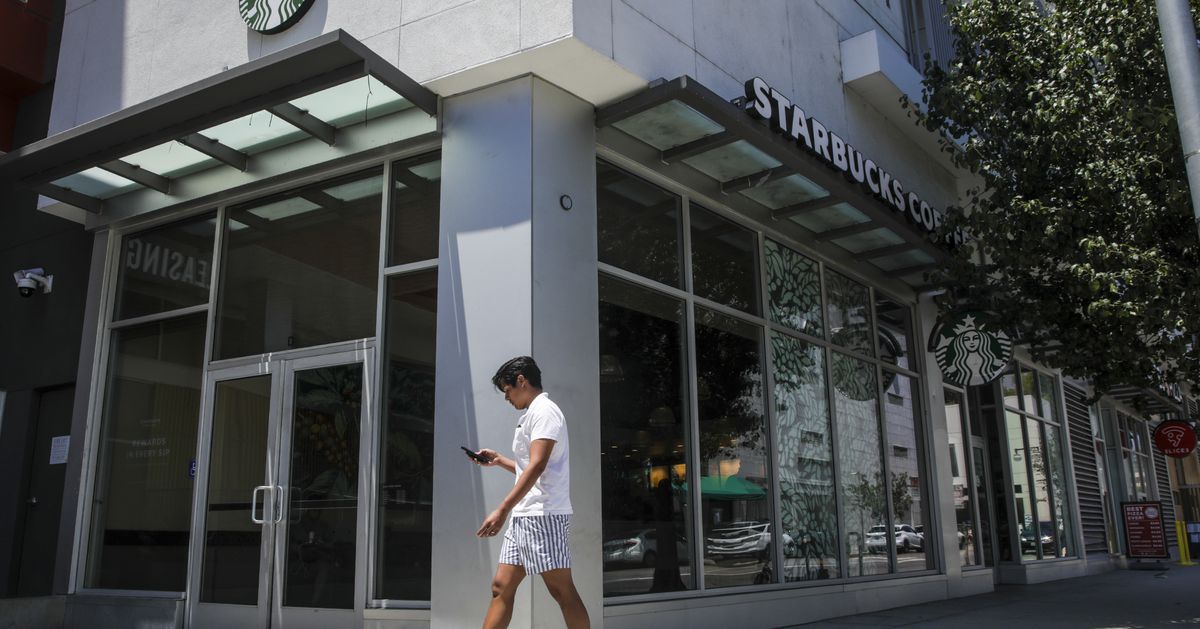
Last week, Starbucks announced plans to close six stores throughout Southern California by the end of the month. The coffee chain, in a statement to the Los Angeles Times, cited “a high volume of challenging incidents that make it unsafe to continue to operate” at the locations, which include Hollywood Boulevard and Vine, as well as the centrally located shop at the corner of Santa Monica Boulevard and Westmount in West Hollywood.
Some Starbucks employees and union leaders allege that the closures are not about safety, but more about breaking up unionization efforts, or the perils associated with too many locations. Starbucks leadership says these problems derive from drug use and threatening behavior, reports the Times.
These are the stores scheduled to close:
- Hollywood Boulevard and Vine in Central Hollywood
- Hollywood Boulevard and Western in Los Feliz
- Santa Monica Boulevard and Westmount Drive in West Hollywood
- First and Los Angeles Streets in Little Tokyo
- Second and San Pedro Street in Little Tokyo
- Ocean Front Walk and Moss Avenue on the Santa Monica Pier
The company arrived at this decision after reading store incident reports from workers, who are also called “partners,” a Starbucks spokesperson told Eater LA. The spokesperson did not go into detail about the frequency of store incidents or note when workers began citing problems, but instead cited “tough challenges” that individual stores have faced in urban centers. According to the spokesperson:
“Our communities are facing tough challenges surrounding personal safety, rising drug use mental health crisis, chronic homelessness, and that sometimes those play out sometimes within the four walls of our Starbucks stores because we’re part of the communities we serve.”
Tyler Keeling, a Starbucks partner and lead union organizer at the Candlewood and Lakewood Boulevard location in Long Beach (one of the first in Southern California to unionize) believes the closures are an intimidation tactic to scare employees from forming a union.
“It feels very strategic, and they chose stores where they could blame a high crime rate,” Keeling says. “One of the big ideas behind unionizing is creating a better work environment for partners, and that includes creating more safe conditions for Starbucks employees. That way, we don’t have to work in fear of any sort of incidents happening. It’s very, very telling for a company that claims to be about its partners first that it’s putting partners, potentially, out of jobs.”
Starbucks’s senior vice presidents of U.S. operations Debbie Stroud and Denise Nelson wrote in a July 11 letter to employees that addressed worker safety, that the company was looking at “modifying operations, closing a restroom, or even closing a store permanently, where safety in the third place is no longer possible, always doing so with the utmost respect for our customers and the community and transferring partners to nearby stores if we close.”
That same day, Starbucks CEO Howard Schultz characterized the closures as part of the company’s reinvention. “We need to reinvent Starbucks for the future. And to be successful, it will take our collective courage to begin again,” Schultz stated in a letter sent to store employees. Absent from the discussion is the company’s open bathroom policy, a requirement imposed in 2018 after law enforcement escorted out two African American men in handcuffs from a Philadelphia Starbucks. When the two sat and did not immediately order food or drinks, the store manager called police. This, along with other incidents, brought about policy change, opening the restrooms to all and removing the requirement to first make a purchase.
:no_upscale()/cdn.vox-cdn.com/uploads/chorus_asset/file/23884998/1397104453.jpg)
When considering these factors, a key question remains: Why did Starbucks choose to close these six locations over others? The Starbucks spokesperson told Eater LA that it “really is the high volume of challenging incidents we’re seeing in those stores that are just making it too hard to create safe environments.”
But when viewing a Southern California map, hone in on the Starbucks locations and adjacent businesses. The store soon closing in West Hollywood is adjacent to a popular Trader Joe’s and features plenty of foot traffic from locals and tourists. It’s also surrounded by popular and longstanding coffee competitors: Dayglo, Gravite Cafe, Dialogue Cafe, Alana’s Coffee Roasters, as well as four other Starbucks within walking distance. None of the other coffee shops have announced plans to close because of issues like public safety. There are currently three locations in Downtown within two blocks of each other, though two will close within two weeks. Nearby the Hollywood and Vine location, there are currently 15 Starbucks outlets in its vicinity between Hollywood to East Hollywood.
Starbucks executives say that employees at closed stores can transfer to neighboring ones. But Keeling says that employees feel blindsided by the announcement. “They’re blaming the incident reports rates as a reason why stores are closing, but there’s no transparency as to what that even means,” says Keeling. “How many internal reports? What’s happening in those stores? Has there been any attempt to prevent that stuff from happening? There hasn’t been any sort of transparency. It just came out of nowhere.”
Of the six Southland stores closing, none are unionized. Throughout 2022, countless news outlets have reported that Starbucks has openly fought unionization efforts, while allegedly firing union organizers, according to NPR. In Southern California, workers at Starbucks on Fairfax and Olympic, Victory and Empire, Foothill and Arroyo in Sylmar, Little Tokyo’s Second and Central, Cypress Park, and others have officially filed to form a union, but have yet to vote for approval. Meanwhile, workers at Anaheim’s Katella location along with Long Beach’s Candlewood Street and Lakewood voted in favor of unionization in the past three months.
Starbucks management denies that the national unionization movement impacted its decision to close these locations.
